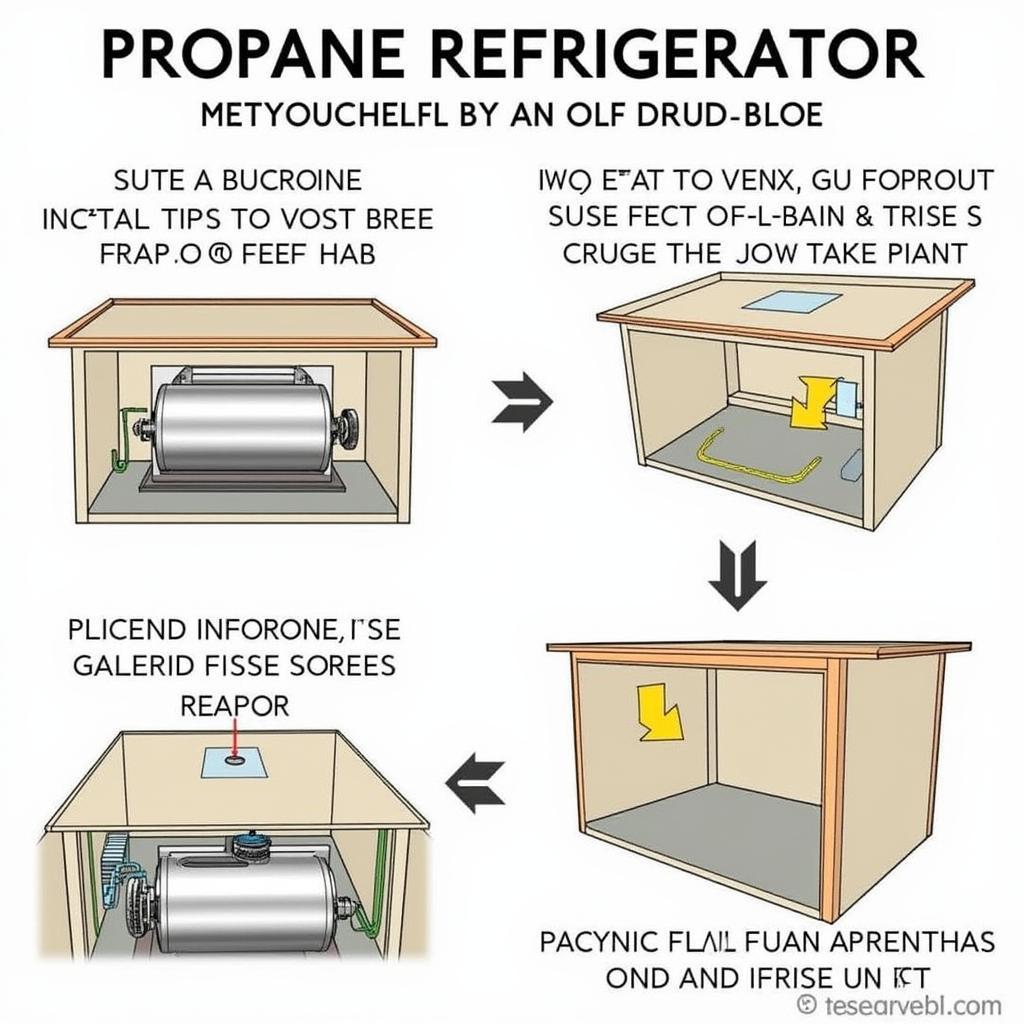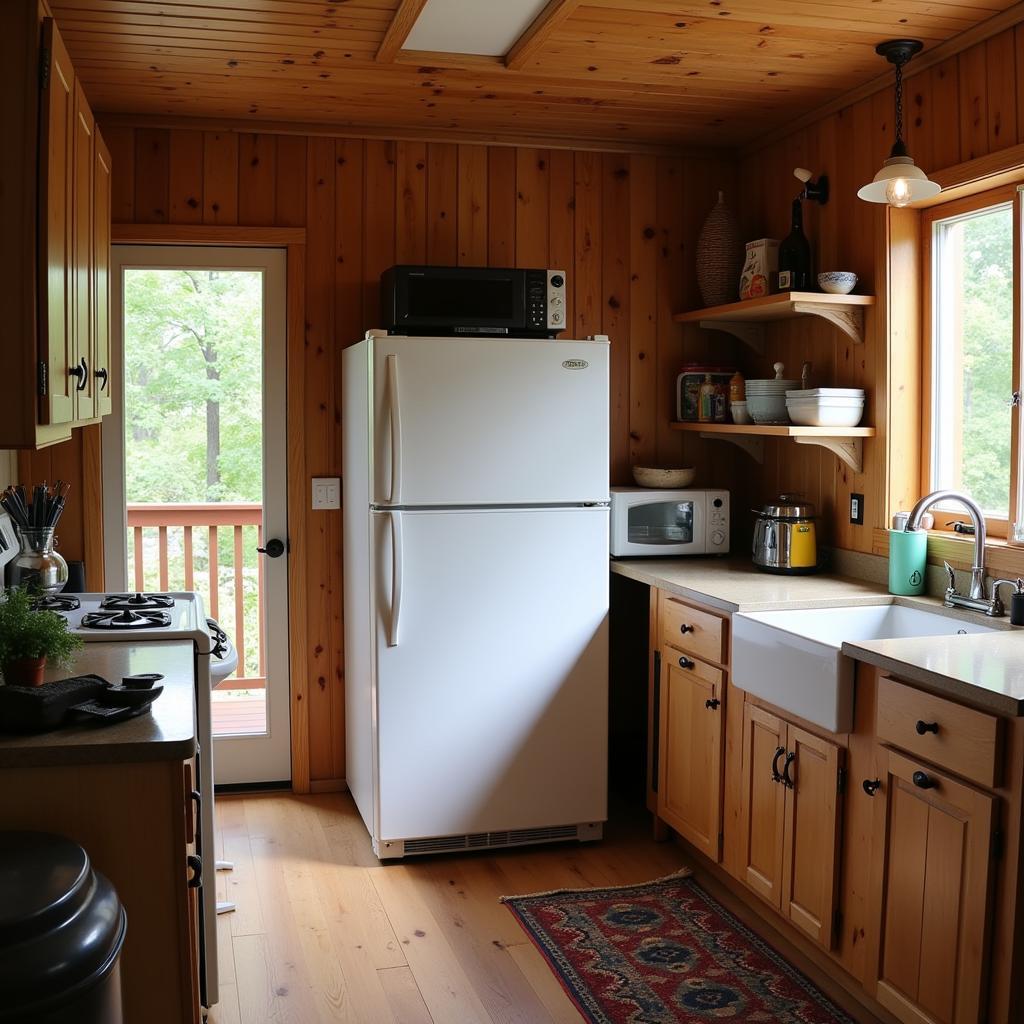Living Off the Grid? Here’s Your Ultimate Guide to Off Grid Refrigerators
October 29, 2024Navigating a life off the grid means rethinking the appliances we often take for granted. And when it comes to keeping your food fresh and drinks refreshingly cold, choosing the right Off Grid Refrigerator is crucial. This guide dives deep into the world of off grid refrigerators, exploring the different types, their pros and cons, and key factors to consider before making your purchase. Let’s empower you to make an informed decision that aligns perfectly with your off-grid lifestyle.
Why You Need an Off-Grid Refrigerator
While traditional refrigerators rely on the power grid, off-grid refrigerators offer a sustainable and independent way to keep your food fresh and safe. Whether you’re embracing solar power, wind energy, or another alternative energy source, an off-grid refrigerator is essential for:
- Food Preservation: Enjoy fresh produce, dairy, and meats for longer, reducing waste and grocery trips.
- Convenience: No more relying solely on canned goods or frequent trips to town for ice.
- Emergency Preparedness: During power outages, your off-grid refrigerator will continue to operate, ensuring food safety.
Types of Off-Grid Refrigerators
When venturing into the world of off-grid living, understanding your refrigeration options is paramount. Here’s a breakdown of the most popular types:
1. Propane Refrigerators
Propane refrigerators have long been a staple for off-grid living. They operate silently and efficiently using propane as their primary fuel source.
Pros:
- Reliable Performance: Propane refrigerators are known for their consistent cooling, even in extreme temperatures.
- Fuel Efficiency: Propane burns cleanly and is a readily available fuel source in most areas.
- Quiet Operation: Enjoy a peaceful environment without the humming noise of a compressor.
Cons:
- Ventilation Requirements: Proper ventilation is essential to prevent the buildup of harmful gases.
- Professional Installation: Installing a propane refrigerator typically requires a qualified technician.
 propane refrigerator installation guide
propane refrigerator installation guide
2. Solar Refrigerators
As the name suggests, solar refrigerators harness the power of the sun to keep your food cold. They run on electricity generated by solar panels, making them an eco-friendly choice.
Pros:
- Environmentally Friendly: Reduce your carbon footprint by using renewable solar energy.
- Cost-Effective Operation: Once your solar panels are installed, running your refrigerator becomes virtually free.
- Quiet and Efficient: Solar refrigerators operate silently and offer excellent energy efficiency.
Cons:
- Weather Dependent: Cloudy days can impact performance, requiring a backup power source like a generator or battery bank.
- Higher Upfront Cost: Solar refrigerators generally have a higher initial investment compared to traditional models.
3. 12V Refrigerators
12V refrigerators, also known as DC refrigerators, are specifically designed to run on direct current (DC) power, making them ideal for RVs, boats, and off-grid living setups.
Pros:
- Versatility: Use them with solar panels, batteries, or even your vehicle’s battery.
- Energy Efficient: 12V refrigerators are designed for low energy consumption.
- Compact and Portable: Many 12V refrigerators come in compact sizes, making them easy to transport.
Cons:
- Limited Capacity: They often have smaller storage capacities compared to propane or solar models.
- Battery Dependence: Ensure you have a reliable battery bank or charging system to power your refrigerator.
Factors to Consider When Choosing an Off-Grid Refrigerator
Choosing the right off-grid refrigerator involves carefully considering your specific needs and circumstances:
1. Size and Capacity
Think about the size of your household and your food storage needs. Refrigerators are measured in cubic feet, and larger families or those who prefer to stock up on groceries will benefit from a larger capacity.
2. Energy Consumption
Energy efficiency is key when living off-grid. Look for refrigerators with high energy star ratings or low wattage consumption rates to minimize your energy usage.
3. Climate
The climate you live in plays a significant role in refrigerator performance. Extreme temperatures can affect cooling efficiency, so choose a model that can handle the climate conditions in your area.
4. Budget
Off-grid refrigerators vary in price depending on the type, size, and features. Set a budget beforehand and explore the options within your price range. Remember to factor in installation costs, especially for propane refrigerators.
Tips for Maximizing Off-Grid Refrigerator Efficiency
No matter which type of off-grid refrigerator you choose, these tips will help you maximize its efficiency and keep your food fresh for longer:
- Proper Ventilation: Ensure adequate ventilation around your refrigerator, especially for propane models, to prevent overheating and ensure optimal performance.
- Optimal Temperature Settings: Avoid setting the thermostat too cold, as it consumes more energy. Aim for a refrigerator temperature between 35°F and 38°F.
- Regular Cleaning: Keep your refrigerator clean and free of dust and debris to ensure proper airflow and efficiency.
- Minimize Door Openings: Every time you open the refrigerator door, cold air escapes, and the appliance has to work harder to cool down again. Limit door openings and make a list before retrieving items.
 organized off-grid kitchen with efficient appliances
organized off-grid kitchen with efficient appliances
Conclusion
Choosing the right off-grid refrigerator is an important step in embracing a sustainable and self-sufficient lifestyle. By understanding the different types, considering your specific needs, and following energy-saving tips, you can keep your food fresh, reduce your environmental impact, and enjoy the freedom of off-grid living. Need help finding the best refrigerator for off grid? Explore our comprehensive reviews to discover the perfect fit for your off-grid haven.
FAQs
1. How long can a propane refrigerator run on one tank?
The runtime of a propane refrigerator on a single tank depends on the tank size and the refrigerator’s efficiency. On average, a standard 20-pound propane tank can power a refrigerator for about 2-4 weeks.
2. Do I need batteries for a solar refrigerator?
Yes, solar refrigerators typically require batteries to store the energy generated by solar panels. The batteries provide power during the night or on cloudy days.
3. Can I use a regular refrigerator with a generator?
While it’s possible to power a regular refrigerator with a generator, it’s not the most efficient option. Traditional refrigerators draw a significant amount of power, requiring a larger, more powerful (and often louder) generator.
4. What is the average lifespan of an off-grid refrigerator?
With proper care and maintenance, off-grid refrigerators can last for many years. Propane refrigerators tend to have the longest lifespan, often exceeding 20 years, while solar and 12V models typically last 10-15 years.
5. Do I need to defrost an off-grid refrigerator?
Some off-grid refrigerators, particularly older models or those without automatic defrost features, may require manual defrosting. Check the manufacturer’s instructions for specific defrosting recommendations.
For more insightful tips and product recommendations to enhance your off-grid lifestyle, check out our lifestyle friendly guides!
Need Help Choosing the Perfect Off-Grid Refrigerator?
We’re here to help! Contact us:
Phone: 0915117113
Email: [email protected]
Address: Tổ 3 Kp Bình An, Phú Thương, Việt Nam, Bình Phước 830000, Việt Nam
Our dedicated customer support team is available 24/7 to answer your questions and guide you toward the ideal off-grid refrigerator for your unique needs.